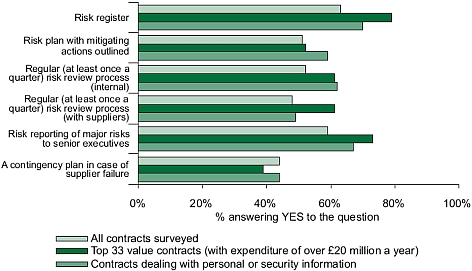Research: Gov't lacks oversight on services contracts

Rigorous contract management is a basic and crucial element necessary to successfully oversee procurement and execution of complex projects. However, new research from the UK Public Accounts Committee, a monitoring group within Parliament similar to the US Office of Management and Budget (OMB), states the UK government mismanages services contracts on a large scale.
Although based on UK data, the lessons should also be applicable to US government projects. The report, titled Central government's management of service contracts, offers this summary [edited for length]:
[The] central government makes limited use of financial incentives to encourage suppliers to improve performance. In addition, 38% of contract managers did not always apply financial penalties where suppliers under-performed. The extent to which central government tests the value for money of ongoing services and contract changes is variable. For example, 41% of contract managers had not tested the value for money of new services purchased under an existing contract.
Planning and governance is one of the weaker areas of contract management, although there are examples of good senior level engagement. Less than half the organizations surveyed, however, had an individual with overall responsibility for contract management, and there was no documented plan for managing 28% of contracts. [M]any contracts do not have in place some or all of the elements of good practice risk management; for example, 56% of contracts did not have a contingency plan in case of supplier failure and 30% of contracts where suppliers were dealing with personal or security information did not have a risk register.
No commercial director/head of procurement rated the level of resources allocated to the management of their major contracts as 'good', and 22% of contract managers considered they did not have time to perform their responsibilities well. Most contract managers had undertaken relevant training, although 60% of organizations did not provide a structured training program for their staff.
This graph shows "37% of respondents did not have a risk register and 56% did not have a contingency plan in case of supplier failure:"

THE PROJECT FAILURES ANALYSIS
In my view, the issues described in the report apply directly to services contracts on IT projects. Successfully completing services projects, which includes most IT initiatives, requires attention to at least several broad phases:
- Establishing appropriate business case
- Analyzing and setting requirements based on the business case
- Procurement
- Execution and delivery
- Monitoring and oversight of the entire process
Projects can, and do, fail at each step of this lifecycle. Monitoring and oversight are therefore essential ingredients necessary to achieve successful outcomes in services-based projects. The UK report emphasizes the haphazard, and sometimes careless, manner in which government agencies handle contract oversight. Given such high rates of IT project failure across the private sector, I suspect many of these deficiencies are equally present in non-government projects.
Recently introduced US Senate legislation, requiring federal agencies oversee IT investment projects more carefully, raises a related issue about the impact of lifecycles on overall project success. Although that bill takes important steps toward reducing catastrophic IT failure arising during the project execution phase, it ignores upstream reasons projects go over-budget, are delivered late, or do not meet expected goals.
The UK report suggests several conclusions and recommendations, including:
- Achieving value for money depends on effective contract management but central government does not accord contract management sufficient attention. [O]rganizations should assign responsibility for contract management policy, practice and capability to a single individual, whose responsibilities should include ensuring that all major service contracts have appropriate governance arrangements and documented contract management plans.
- Without [measures to oversee suppliers], central government cannot effectively measure and drive supplier performance. [O]rganizations should ensure that all their major service contracts have performance measures, and that these measures are updated as necessary to meet changing business requirements.
- The failure to enforce financial penalties whenever suppliers under-perform increases the risk that relationships between central government and suppliers are too cozy. Central government organizations should apply financial penalties when contracts entitle them to do so unless there are very exceptional circumstances why they should not.
- Central government organizations do not routinely test the value for money of their service contracts. As a result, there is no assurance that the contracts concerned are providing value for money and that opportunities for savings are not being missed. The expectation should be that the value for money of ongoing services provided under major service contracts should be tested at least every three years. All significant changes to major service contracts should be tested as a matter of course.
- [O]rganizations should undertake a review of the resourcing of contract management activities across their portfolio of major service contracts and take action where the review indicates that resources are not being used to best effect.
- Organizations should improve the support available by providing contract management training where necessary [and] facilitate the sharing of best practice among contract managers.
- Risk management arrangements are inadequate for many contracts. [O]rganizations should review the risks associated with their major service contracts and put in place good practice risk management processes, including risk registers and contingency plans.
We should remember the key point that successful project completion depends on all the life cycle stages I mentioned earlier. Few organizations focus equally on every phase, which is precisely why so many projects don't achieve planned goals.
This research brings attention to an important contributing factor of overall project failure and is therefore a welcome call to arms on this issue.